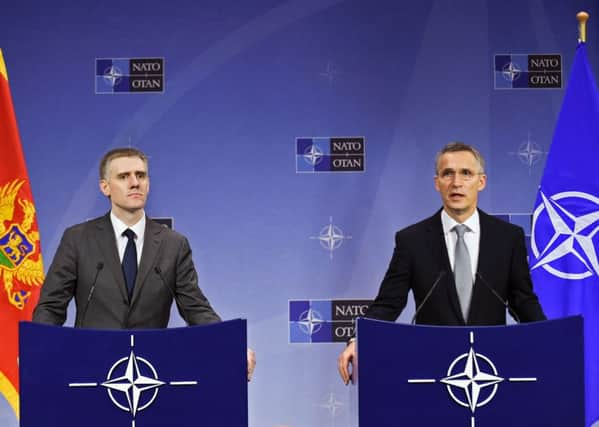Nato invitation to Montenegro prompts Russian warning


US secretary of state John Kerry insisted that Nato is “not a threat to anybody”.
Alliance secretary-general Jens Stoltenberg said the invitation to Montenegro reaffirmed Nato’s “open door” policy toward potential member states including Georgia, and promised a statement later with “renewed commitments to our strong support of Georgia’s aspiration for Nato membership” – another move that could rankle Moscow.
Advertisement
Hide AdAdvertisement
Hide AdMr Stoltenberg announced the “historic” invitation to Montenegro yesterday, the second day of a two-day meeting of Nato foreign ministers.
“Today, we took another step toward the full integration of Europe and toward the common defence by inviting Montenegro into the alliance,” Mr Kerry said.
The planned expansion of the alliance rooted in the Cold War, which grew to 28 members in 2009, comes amid rising tensions between Nato and Russia over a variety of issues including Syria, the conflict in eastern Ukraine, Russia’s annexation of Crimea and a new Russian assertiveness in the skies in northern Europe. Russia has opposed the Nato accession of Montenegro.
President Vladimir Putin’s spokesman, Dmitry Peskov, said that Russia will be looking at possible retaliatory measures.
Viktor Ozerov, chairman of the defence committee at the upper house of the Russian parliament, told state-owned RIA Novosti news agency yesterday that Russia will freeze joint projects with Montenegro including defence co-operation.
Mr Kerry sought to dispel Moscow’s concerns.
“Nato is not a threat to anybody,” he said. “It’s not an offensive organisation. It’s a defensive alliance. It is meant to simply provide security.”
Montenegrin defence minister Milica Pejanovic Djurisic said the invitation “is a confirmation of our great progress in the sectors of defence and other areas relevant to the alliance accession”.
In 1999, Montenegro, then in a union with Serbia, was heavily bombarded in the first waves of Nato airstrikes which were triggered by Serbia’s violent crackdown against independence-seeking Kosovo Albanians.
Montenegro became refuge for Serbia’s pro-Western opposition leaders and dissidents who were persecuted by Serbia’s then-leader, Slobodan Milosevic.